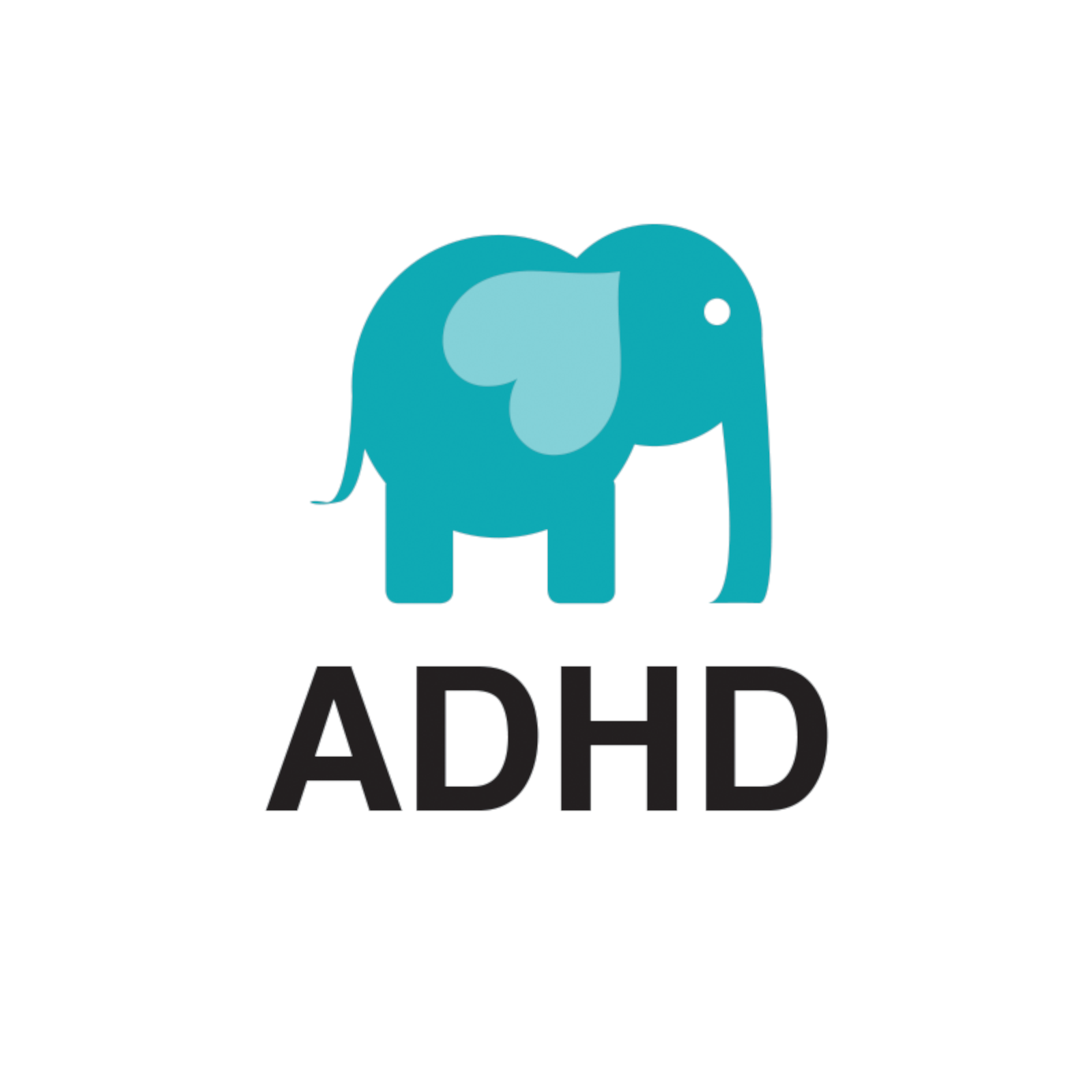
818.5K
Downloads
213
Episodes
Drawing on years of experience working with families, Parenting Coaches Siope Kinikini and Kimber Petersen share how families can improve, heal, and find success using the proven methods of the Teaching-Family Model. Visit smarterparenting.com to learn more.
Episodes
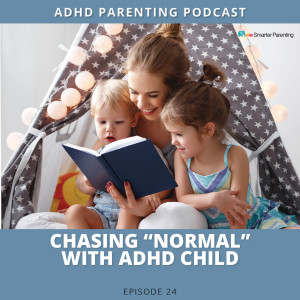
Tuesday Sep 03, 2019
Ep #24: Chasing "normal" with ADHD kid
Tuesday Sep 03, 2019
Tuesday Sep 03, 2019
Wanting what is best for our child is normal. Chasing “normal” with ADHD child can often be a frustrating endeavor as our “normal expectations” may not be realistic or helpful for our child. When children don’t hit the “milestones” we expect, it can be frustrating and can damage our relationship.
We can do a disservice to our child when we compare them to other children, even to other kids with ADHD. When we compare our child with ADHD, we can fail to see the milestone they do accomplishment.
Using the ADHD behavior skill of Effective Praise will help recognize what they are doing well and to tell them. When you recognize what they’re doing well, it gives them confidence in their abilities.
Chasing normal with our ADHD child means setting new and realistic goals based on their strengths and not on some predetermined path. Our goal as parents is to help them on their path and to give them the skills they need to be successful long-term.
To help parents, Smarter Parenting has launched ADHD Parenting Coaching. ADHD Parenting Coaching is one-on-one video coaching done from the comfort of your home--no need to go anywhere. An ADHD Parenting Coach can help with challenging behavior, point out your strengths, and help you set realistic expectations for your ADHD child.
For a limited time, Smarter Parenting is offering free 15-minute mini-sessions. Even in 15-minutes you can get incredible insight and help. Sign-up https://www.smarterparenting.com/coaching/
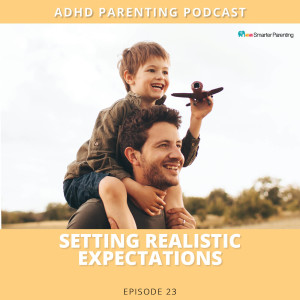
Tuesday Aug 27, 2019
Ep #23: Setting daily intentions
Tuesday Aug 27, 2019
Tuesday Aug 27, 2019
At the Qualtrics conference in March 2019, Oprah stated that the secret to her success was setting realistic intentions. The thought behind setting intentions for the day is that before you do anything else, you decided the intention or goal, that you want for the day. By setting intentions for the day it allows you to have a mind-shift, and the energy to focus as everything you do is now seen through that intention.
The power of intention is that it gives you control over the day. Instead of waking up and picking up your phone and instantly feeling like a failure because your life doesn’t look like another’s, you’re able to tell the world what you expect from it rather than the other way around. It’s a simple thing, but it allows you to set boundaries and practice self-care, which leads to confident living.
As an ADHD parent, it can feel overwhelming to think about setting realistic intentions for the day as it’s one more thing we have to do. This simple exercise can help you deal with all the pressures you face. It gives you a “game plan” of sorts and helps you mentally prepare for everything that is on your plate. When you feel rejuvenated, you’re able to handle the day more effectively. It’s when we’re tired and overwhelmed that everything seems so much worse as we don’t have the energy to handle it. Taking time for yourself is essential and does not make you a bad parent (even if you feel like it does).
Successful parents are those who have found a way to balance their self-care with what their child needs.
Setting intentions is a lot like the behavior skill of Preventive Teaching. Preventive Teaching is all about preparing your child for what they may encounter by setting realistic expectations for their behavior.
We want you to try setting daily intentions for one week. These intentions don’t have to be large or take up a ton of time. It can be as simple as, “How do I want to feel at the end of the day? What do I need to do to feel that way?” So, if at the end of the day you want to feel calm, then you’ll need to add small activities (away from your phone) to your day that allows you to feel that way. It may be taking a bath, eating a favorite treat, going for a walk, having lunch with a friend, or taking a small nap.
We can’t stress it enough. There is power in setting daily intentions. Trust us when we say that doing this small thing can have a significant impact on the relationships you have.
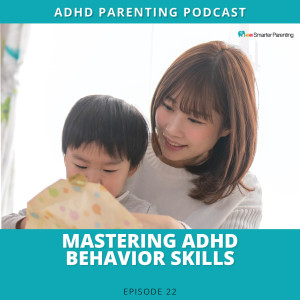
Tuesday Aug 20, 2019
Ep #22: Mastering ADHD behavior skills
Tuesday Aug 20, 2019
Tuesday Aug 20, 2019
Mastering ADHD behavior skills gives parents the tools they need to handle any behavior situation. Behavior intervention strategies are essential components of ADHD management and make your life easier. They will allow you to feel like you have control, no matter what comes your way.
When you have mastered the basics, you’re able to improvise and create solutions even if you’ve never been in that situation before.
In 1975, pianist Keith Jarrett arrived for a concert in Koln Germany. Instead of finding a concert piano for him to play, he found a practice piano that wasn’t working correctly and was out of tune. Jarrett stated he wouldn’t play on that instrument because of his limitations. After a lot of pleadings by the stage manager, he agreed to do the concert. Jarrett recorded the concert. At the end of the concert, he received a standing ovation. The album of the concert became one of the best-selling albums of that year.
He was successful because he not only knew the basics, but because he had mastered the basics. He knew the limitations of the piano and what he would need to do to overcome those limitations to create something incredible.
Having the basics down gives you power as it allows you to remain in control and not get flustered when things don’t like we expected or imagined.
Behavior skills are an essential part of your child’s ADHD treatment plan. Behavioral therapy for ADHD kids helps them learn to recognize and overcome their shortcomings in a way that allows them to create something incredible and successful. Much like Keith Jarrett was able to do in Koln.
SmarterParenting.com teaches behavior intervention strategies called behavior skills. Each skill taught in video lesson form. Watching the video isn’t enough to master the skill; the skill must be practiced and practiced often.
As busy parents, it can be hard to find time to learn new behavior. Even small investments will eventually have long-term payoffs when it comes to mastering ADHD behavior skills. There are multiple ways to integrate ADHD behavior skills in everyday life. You can practice in the car, or while you're getting ready, or around the dinner table.
The goal with behavioral therapy for ADHD is to give you the tools so that you feel confident in handling anything that comes your way. Are they throwing a tantrum? Are they defiant? Those behaviors don’t scare you as you’ve got a toolbox full of tools that you feel confident in using.
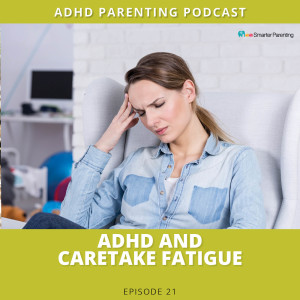
Tuesday Aug 13, 2019
Ep #21: ADHD and caretake fatigue
Tuesday Aug 13, 2019
Tuesday Aug 13, 2019
In episode 21, ADHD Parenting coach, Siope Kinikini, talks about ADHD and caretaker fatigue.
Caretaker fatigue is real, especially when parenting an ADHD child as they have so much energy. Having to be always “on” to deal with all that energy can be draining-emotionally, physically, mentally. Being “on” will eventually take its toll, so it’s important for parents to avoid the ADHD burn-out by practicing self-care.
Many parents feel guilty for practicing self-care, but practicing self-care is not selfish.
If you don’t feel like you have time to practice self-care, that is exactly when you need to. We know finding the time to practice self-care between school, work, family, and extracurricular activities are hard, and adding one more thing to the plate may seem overwhelming. But when you are operating at half-capacity, it becomes harder to deal with their behaviors.
By taking care of yourself first, you have the ability to provide the best care for your child, which we know is what you want to do.
Our first recommendation for self-care is to find someone you can talk to and who will listen. Whether that is a support group for parents of ADHD child, a family member, or a friend, whomever you choose, make sure they will listen without giving a lot of opinions, and only when you ask for it.
Our second recommendation for self-care is to take a break and find something that rejuvenates you. It doesn’t need to be time-intensive or requires a lot of stuff. It could be making yourself a cup of tea, a bubble bath, reading a book, take a short break, or take a nap.
Taking a break doesn’t have to happen just once a day. You can set up small breaks throughout the day.
Our third recommendation is to get enough sleep. Without sleep, your ability to help your child is greatly diminished as you have nothing to give them.
Our fourth recommendation is to have regular check-ups with your doctor. Being an ADHD mom is hard and regularly checking in with your doctor allows you to evaluate your mood and what is going on. This is one area where we tend to be terrible at. We take our kids to the doctors, but often we put off going ourselves.
We encourage you this week to find a few ways that you can add self-care and avoid ADHD and caretaker fatigue and ADHD burnout.
If you have any great self-care ideas that you’d like to share with other ADHD parents, please send us a message. Smarterparenting@smarterparenting.com
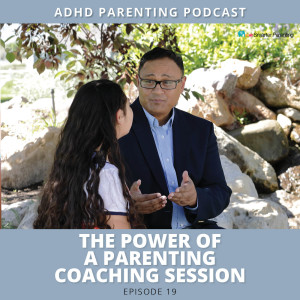
Tuesday Jul 30, 2019
Ep #19: The power of a parenting coaching session
Tuesday Jul 30, 2019
Tuesday Jul 30, 2019
Parenting is hard, and all of us could use a little parental guidance! We are so excited to announce that we’re doing online parenting coaching!
The power of a parenting coaching session lies in having a behavior specialist listening and giving you specific positive parenting solutions for your child and family.
Online coaching sessions are done in the privacy of your own home and at a time that works for you.
We know that many worldwide are searching for parenting skills, and by offering online coaching, we can reach struggling families no matter where they are.
Not only is there power in a parenting coaching session, but there’s also a lot that people can learn from watching other parents being coached. Being able to watch parenting coaching sessions will be part of the ADHD Parenting Club that Smarter Parenting will be launching in the fall of 2019.
The first 15-minute online coaching session is free. If you want to continue getting parental guidance through online coaching, there will be a charge.
Sign-up today and begin utilizing the power of a parenting coaching session!
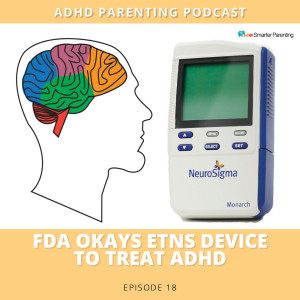
Tuesday Jul 23, 2019
Ep #18: FDA okays eTNS device to treat ADHD
Tuesday Jul 23, 2019
Tuesday Jul 23, 2019
In episode 18, ADHD parenting coach discusses the FDA’s approval of eTNS device to treat ADHD. It has been approved to treat children from 7 to 12 who have been diagnosed with ADHD and are not currently on ADHD medication.
Carlos Peña, Ph.D., director of the Division of Neurological and Physical Medicine Devices in the FDA’s Center for Devices and Radiological Health, said of the device in the press release. “This new device offers a safe, non-drug option for treatment of ADHD in pediatric patients through the use of mild nerve stimulation, a first of its kind. Today’s action reflects our deep commitment to working with device manufacturers to advance the development of pediatric medical devices so that children have access to innovative, safe and effective medical devices that meet their unique needs.” (https://www.medpagetoday.com/neurology/adhd-add/79346)
The eTNS (external Trigeminal Nerve Stimulation) system is a nerve stimulation treatment that delivers low-level stimulation to branches of the trigeminal nerve. The pulse is delivered via a patch on the child’s forehead.
The belief is that by stimulating the Trigeminal nerve, signals are sent to the brain controlling the areas that control function, which is one of the areas in which ADHD children struggle.
According to the manufacturer, the device is as big as a cell phone, and the treatment is administered overnight. It is not currently covered by insurance and costs about $1,000.
When new ADHD treatment options become available, it’s easy to get really excited about what the new treatment means. One of the concerns with the approval of the eTNS is that we don’t know the long-term effects of the device.
The trial period of this device was only four weeks and involved roughly 60 kids. They did see a reduction in treating ADHD with minimal side effects. With that length and sample size, we don’t know what long-term effects of sending electrical pulses to the brain will be.
This new device is just one of the non-medication treatment options available to ADHD children. Other options include the behavior skills available on Smarter Parenting.
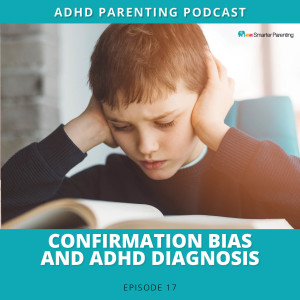
Tuesday Jul 16, 2019
Ep #17: Confirmation bias and ADHD diagnosis
Tuesday Jul 16, 2019
Tuesday Jul 16, 2019
Confirmation bias is our tendency to cherry-pick information that confirms our existing beliefs or ideas. Everyone has confirmation bias as everyone has different life experiences that shape how they view the world. It is why two different people can look at the same situation and draw two different conclusions.
It is easy to experience confirmation bias with an ADHD diagnosis. What we mean is that we will highlight any behavior that we believe confirms ADHD symptoms, while ignoring those things that don’t fit into our belief. It’s human nature to seek out those things that confirm our beliefs.
Because of this, we recommend starting with a pediatrician instead of going straight to a specialist as a specialist may see an ADHD diagnosis because they are looking for an ADHD diagnosis. A pediatrician sees a lot of different children behavior and is able to rule out behaviors and diagnosis instead of ruling in a diagnosis.
Confirmation bias can be dangerous once you have an ADHD diagnosis as it’s easy to view the world through the diagnosis. Especially if you believe the diagnosis means your child won’t be able to be successful.
When parenting kids with ADHD, it’s important to step back and look at what you believe so you can challenge it. Challenging beliefs allows you to look at situations from a mind-frame of how can I help or how can I be resourceful in helping my child. One of the reasons people go to therapy is that one of the purposes of therapy is to help us challenge our thinking and our confirmation bias.
Challenging our confirmation bias is something that we need to do continually as our kids grow and change--and so do we. When we challenge our confirmation bias, we can improve. Helping our children grow and change is one of our duties as parents.
Parenting a child with ADHD is possible when we challenge our confirmation bias of what an ADHD diagnosis means.
For full show transcript visit: https://www.smarterparenting.com/adhd-parenting-podcast/
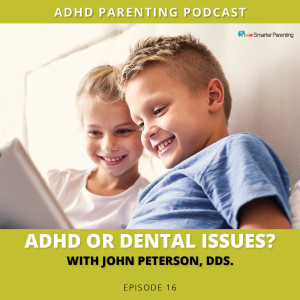
Tuesday Jul 09, 2019
Ep #16: ADHD or dental issues with John Petterson DDS
Tuesday Jul 09, 2019
Tuesday Jul 09, 2019
Do you think your child has ADHD but Is it ADHD or dental issues? In today’s episode, we talk with Dr. John Peterson about dental problems mimicking ADHD and options parents have for improving their child’s overall well-being using The Healthy Start system.
Many children suffer from sleep apnea and other sleeping issues. These sleeping issues can mimic the symptoms of ADHD. Sleep apnea in children can manifest as poor school performance, lack of focus, anxiety, headaches, allergies, and behavioral issues. A good night's sleep is so important, but especially for children as lack of sleep can make other matters worse, such as their ability to make good decisions or to control their emotions.
Does ADHD cause sleep problems? Because ADHD and sleep issues often go hand-in-hand, many blame their child’s ADHD for their difficulty falling or staying asleep. From the data collected by the Healthy Start system, it’s difficult to tell the difference between children with ADHD and children with sleep apnea.
When the cause of the miserable night’s sleep is addressed, many children see a reduction in ADHD symptoms and behaviors by treating the underlying cause of these issues.
Often, things like grinding our teeth, inattentiveness, or anger are the manifestation of underlying issues.
The Healthy Start system believes that it’s better to guide teeth into place while they’re growing than to fix the teeth after they’re already established. While the general age is between 6-12, children as young as 2 or 3 can benefit from the Healthy Start system.
The Healthy Start system has also helped children who wet the bed because the part of the brain that controls our bladder also controls our sleep. So if our body is having issues sleeping, our brain will be focusing on that and will not be monitoring our bladder.
For many children getting a sleep study done when they start to exhibit ADHD symptoms can help a doctor determine if they really have ADHD or are suffering from sleeping issues.
For more information on the Healthy Start System visit:
For full show transcript visit: https://www.smarterparenting.com/adhd-parenting-podcast/
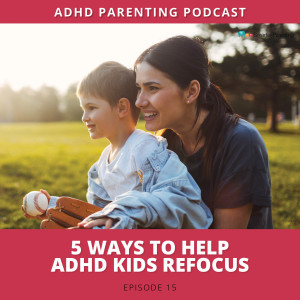
Tuesday Jul 02, 2019
Ep #15: 5 ways to help ADHD kids refocus
Tuesday Jul 02, 2019
Tuesday Jul 02, 2019
Join the Smarter Parenting Club and learn additional strategies to help kids become successful. https://club.smarterparenting.com/
One of the biggest questions we get is how to help ADHD kids focus. As a parent, it can be incredibly frustrating to have to give the same instruction over and over again. Or to watch them not be able to accomplish simple tasks because they’re constantly being distracted.
In episode 15, ADHD coach Siope Kinikini shares five different refocus activities for children with ADHD. These activities are things that require limited prep and are things that a child can do on their own to focus.
How to help a child with ADHD refocus is to understand what’s going in their brain. Children with ADHD often struggle with being able to think in terms of the future. They often think in terms of now. This means they are easily distracted by what is happening to them right that moment or what they want right now. Because of that, they have a hard time with delayed gratification. It is why your child's focus is always shifting as new “nows” are continually presenting themselves.
Because they have a short attention span, ADHD kids are easily prone to boredom which can be frustrating for them as they’re not able to be fully present to what is happening around them. It’s why it’s essential for them to have ADHD coping skills.
These five activities help ADHD kids focus.
Isometric exercises
Isometric exercises are activities that involve pushing or pulling movement and focusing on that movement. These exercises can be done sitting down or standing up. Some isometric exercises include pushing hands or knees together, or pushing your hands into a desk, table or your legs. There are tons of different isometric activities for children with ADHD
Stress ball or fidget toys
ADHD kids do well with tactile refocus activities. This includes things like stress balls or fidget spinners. You can easily make stress balls out of balloons and beans, rice, sugar. Etc. Just fill the balloon with the ingredient and tie it off.
Give them a challenge
This one is especially good for school time as a way to excite their brains so that they won’t be bored. The idea is to give them a challenge that would make doing a task more difficult which would require increased focus. For example, if they’re right-handed, have them write with their left hand. Once they have completed it, then have them switch to another challenge. The goal is for them to find small things that help them to refocus.
Mindfulness
Mindfulness is a great way to focus for kids as it helps them reset by being aware of what their body is doing. Some mindfulness ideas are to close their eyes and take a deep breath. Or to count backward while breathing out.
Focus on a specific color or thing
This one is great as it turns focusing into a game. When your child starts to feel their attention slipping, have them close their eyes and pick on one thing to focus on when they open their eyes. This could be a color or an object.
The purpose of all these refocus strategies is to give a child a purpose in their distraction instead of being distracted by everything thing,
Being able to refocus gives your child power as they learn that they do have control over their body and their thoughts. We can't wait to hear how these were able to help ADHD kids focus better.
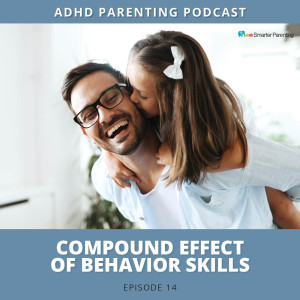
Tuesday Jun 25, 2019
Ep #14: Compound effect of behavior skills
Tuesday Jun 25, 2019
Tuesday Jun 25, 2019
The compound effect of behavior skills does exist. Thousands of families have seen how using one behavior skill then another behavior skill has a compound effect to reduce behavior problems and increase feelings of trust and love.
When implementing new behavior skills for kids you will not see the compound effect of changing behavior overnight, but you will see them. Some families see small changes in a few weeks, where other families have to work on it for months before they notice those same changes. That’s okay. Each family and each child is different and will learn and progress at different rates.
This is especially true for a child with ADHD who make need longer to grasp a concept or an idea.
Investing the time to change your child’s behavior is just like investing in your 401K. You know if that if you are consistent in contributing just a little to your 401 K eventually you’ll that little effort will have a big pay-off. The same principle applies to your child.
Your objective is to make small incremental changes that have a lasting impact. Those changes will come if you are consistent in using behavior skills for kids. Sometimes you won’t be able to notice those changes until you reflect back on where you are now vs. where you were when you started.
Your child may still tantrum when told no. Instead of having an hour-long tantrum that involved violence to others they may now only tantrum for 15 minutes and not resort to violence. While it may not feel like a win because they are still tantruming, it is! Their ability to reduce their length of tantrums and better control their emotions shows the compound effects of behavior skills to improve life.
This is especially true in behavior management. When you are changing behavior, you will notice that the compound effect of behavior skills is far-reaching. You will hear your children use their behavior skills on their siblings, their friends, and even strangers.
One of the biggest responsibilities of a parent is of parents as teachers. You are here to help guide, shape, and encourage your child. Children don’t always know how to handle the world, so it’s up to you to show them how. It’s okay for your child to be angry, sad, or disappointed. What is not okay is how they respond to those feelings of anger, sadness, or disappointment.
Behavior problems don’t have to be a constant struggle. There is a better way. It’s using the behavior skills of the Teaching-Family Model. When used together, they will have a compound effect on your child and your relationship and will help them find success.
